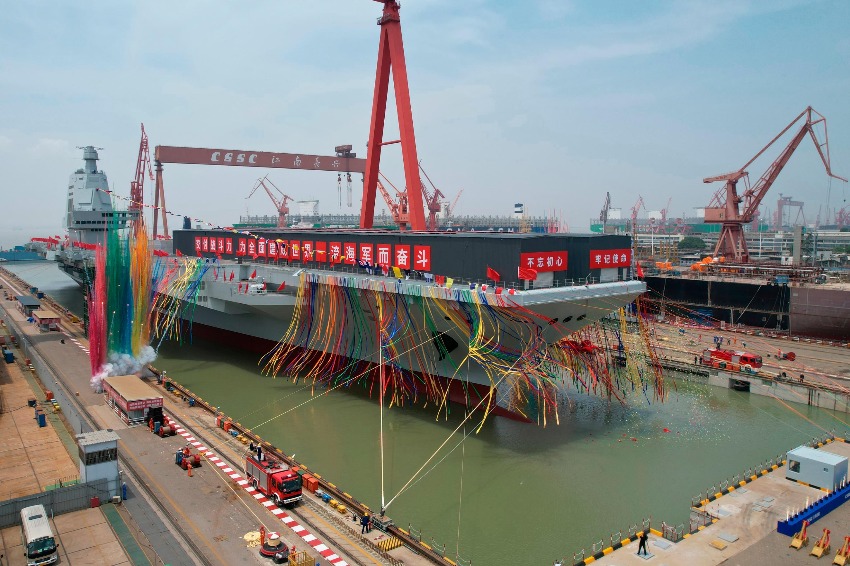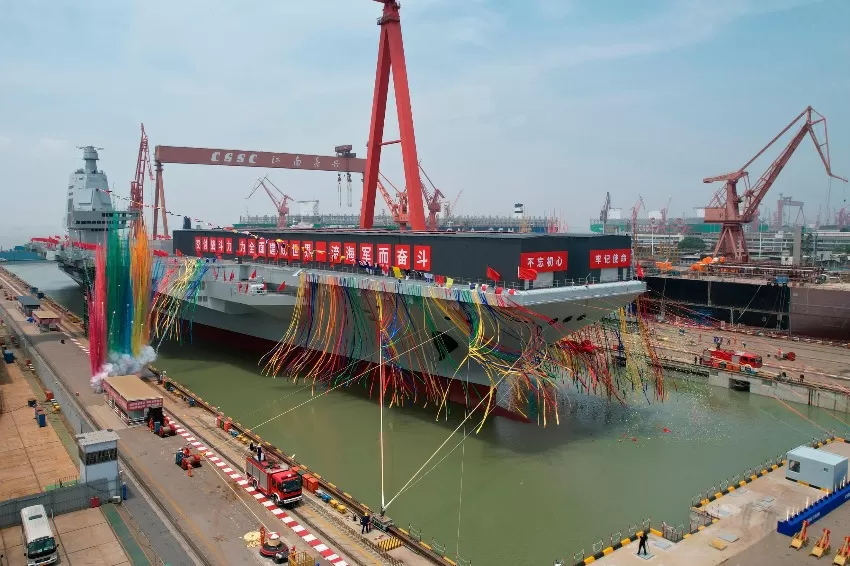

(c) CNN
![]()
![]()
The ship, dubbed “Fujian,” is China’s first domestically designed and built catapult aircraft carrier, according to state-run news agency Xinhua.
According to the Center for Strategic and International Studies (CSIS), a Washington-based think tank, its catapult-assisted launch technology is a significant enhancement over the Liaoning and Shandong’s less advanced ski jump-style launch systems.
The new system, which is comparable to that used by US aircraft carriers, will enable China to launch a larger range of aircraft from Fujian at a faster rate and with more ammunition.
In addition to the launch mechanism, the Fujian has blocking devices and a full-load displacement of more than 80,000 tons, according to Xinhua. After the launch, the ship will conduct anchoring and navigation tests.
The new ship will be the Chinese military’s “first foray into a modern aircraft carrier,” according to Matthew Funaiole, senior fellow at CSIS’s China Project.
He says that this is a really major step forward, and that they’ve put a lot of effort into developing a carrier program, and they’re still pushing the limits of what they can do.
China names its aircraft carriers after its coastline provinces, beginning with Liaoning in the northeast and ending with Shandong in the east. The nearest province to Taiwan is Fujian in the southeast, separated by a strait that is less than 80 miles (128 kilometers) wide at its narrowest point.
Despite never having administered Taiwan, China’s ruling Communist Party claims sovereignty over the self-governing democracy. Xi Jinping, the Chinese president, has stated repeatedly that “reunification” between China and Taiwan is unavoidable and has refused to rule out the use of force.
China today commands the world’s greatest naval force, and aircraft carriers are the backbone of any major power’s navy. The large ships function as mobile airbases, allowing for the fast and long-term deployment of aircraft and weaponry to a conflict zone.
China’s naval buildup coincides with rising geopolitical tensions with the United States, which is attempting to improve connections with friends and partners in the Asia-Pacific area under President Joe Biden in order to counter Beijing’s expanding economic and military dominance.
Last year, Beijing objected to AUKUS, a security deal between the United States, the United Kingdom, and Australia in which the three countries agreed to share military information and technology in order to build a tighter defense partnership in Asia. The naval maneuvers, which were attended by members of the Quad, a resurgent informal discussion group between the United States, Japan, Australia, and India, have further upset Beijing.
HYCO1 and Malaysia LNG (MLNG) teamed up through a memorandum to establish a revolutionary carbon capture and utilization plant in…
OpenAI has released a significant update to ChatGPT, a big leap toward online shopping revolution. Starting this Monday, the new…
The All Blacks have a tough week, with Anton Lienert-Brown and Mark Telea suffering setbacks which will affect Super Rugby…
British-Filipino alt icon beabadoobee is coming home to Manila on her Asia Tour 2025. Be sure to save the date,…
In a unique melding of old spirituality with new technology, Johor's Tianhou Temple claims to have the first-ever Mazu statue…
Former DIA member Somyi is returning to the hallowed halls of K-Pop following legal troubles and a bitter stint in…
This website uses cookies.
Read More